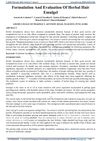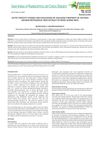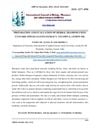 1 citations,
December 2022 in “Türk tarım - gıda bilim ve teknoloji dergisi”
1 citations,
December 2022 in “Türk tarım - gıda bilim ve teknoloji dergisi” Diversifying tea products can boost profits and meet global market demands.
 10 citations,
November 2015 in “Plant Foods for Human Nutrition”
10 citations,
November 2015 in “Plant Foods for Human Nutrition” Hibiscus petals helped control blood sugar and improve liver and pancreas health in diabetic rats.
 June 2021 in “Journal of Emerging Technologies and Innovative Research”
June 2021 in “Journal of Emerging Technologies and Innovative Research” Rice water and hibiscus can help improve hair health and growth.
 February 2020 in “Journal of emerging technologies and innovative research”
February 2020 in “Journal of emerging technologies and innovative research” The herbal hair emulgel was effective and stable for promoting hair growth, reducing dandruff, controlling hair fall, and preventing greying.
 3 citations,
July 2019 in “International journal of scientific research in science and technology”
3 citations,
July 2019 in “International journal of scientific research in science and technology” Herbal hair gel with fenugreek seed extract was found to increase hair growth.
 9 citations,
March 2011 in “Oxidative stress and disease”
9 citations,
March 2011 in “Oxidative stress and disease” Some herbal treatments are effective for skin disorders, but more research and regulation are needed.
 September 2019 in “Asian Journal of Pharmaceutical and Clinical Research”
September 2019 in “Asian Journal of Pharmaceutical and Clinical Research” Teak seed extract is safe and reduces pain in mice.
11 citations,
December 2020 in “Advanced structured materials” Natural products like coconut oil and aloe vera are beneficial in cosmetics for their healing properties.
 November 2017 in “Asian journal of pharmaceutical and clinical research”
November 2017 in “Asian journal of pharmaceutical and clinical research” Three compounds from Dadap leaves may help treat hair loss.
 November 2024 in “International Journal of Biology Pharmacy and Allied Sciences”
November 2024 in “International Journal of Biology Pharmacy and Allied Sciences” The herbal shampoo is safe, effective, and may reduce hair loss and promote growth.
 3 citations,
January 2011 in “Journal of biologically active products from nature”
3 citations,
January 2011 in “Journal of biologically active products from nature” The F1 herbal mixture grew hair well and could treat hair loss without the side effects of common treatments.
 March 2024 in “International Journal of Clinical Pharmacokinetics and Medical Sciences”
March 2024 in “International Journal of Clinical Pharmacokinetics and Medical Sciences” Herbal hair serums offer multiple hair and skin benefits and are becoming more popular.
May 2024 in “Pharmacia/Farmaciâ” Purple sweet potato leaf extracts can help treat hair loss and fungal infections.
 March 2021 in “International journal for research in applied science and engineering technology”
March 2021 in “International journal for research in applied science and engineering technology” Herbal hair dyes from tannin-rich plants are effective and safer than synthetic dyes.
 17 citations,
February 2015 in “Phytochemistry Reviews”
17 citations,
February 2015 in “Phytochemistry Reviews” Southeast Asian herbs show promise for skin and hair care, but more research is needed to confirm their effectiveness in cosmetics.
 1 citations,
January 2016 in “Springer briefs in molecular science”
1 citations,
January 2016 in “Springer briefs in molecular science” I'm sorry, but there's no information provided for me to summarize.
 14 citations,
October 2020 in “Natural Products and Bioprospecting”
14 citations,
October 2020 in “Natural Products and Bioprospecting” Various treatments, including FDA-approved drugs, natural products, and oral supplements, can help with hair loss, but a patient's medical history and potential allergies should be considered when choosing a treatment.
October 2023 in “Jurnal Ilmu Kefarmasian Indonesia” Cinnamon essential oil and virgin coconut oil hair tonic promoted hair growth, with the highest concentration performing better than the positive control.
 31 citations,
September 2009 in “Natural Product Research”
31 citations,
September 2009 in “Natural Product Research” Citrullus colocynthis fruit extract may effectively treat testosterone-related hair loss, similar to finasteride.
 1 citations,
February 2021 in “Cosmetics”
1 citations,
February 2021 in “Cosmetics” Fagraea berteroana fruit extract may promote hair growth by affecting cell proliferation and hair growth pathways.
 9 citations,
January 2017 in “Food & Nutrition Research”
9 citations,
January 2017 in “Food & Nutrition Research” Rice bran mineral extract may help promote hair growth and prevent hair loss.
 January 2020 in “Journal of Pharmacognosy and Phytochemistry”
January 2020 in “Journal of Pharmacognosy and Phytochemistry” The VCO-based herbal hair tonic is effective, safe for hair loss treatment, and can be mass-produced.
 19 citations,
January 2010 in “International Journal of Ayurveda Research”
19 citations,
January 2010 in “International Journal of Ayurveda Research” Tectona grandis Linn. seeds extract improved hair growth in mice better than minoxidil.
 1 citations,
February 2017 in “Journal of pharmacology & clinical research”
1 citations,
February 2017 in “Journal of pharmacology & clinical research” The herbal hair gel with Eclipta alba and Lippia nodiflora extracts was more effective at growing hair than the control gel and minoxidil.
 7 citations,
January 2017 in “Clinical and medical investigations”
7 citations,
January 2017 in “Clinical and medical investigations” Suriname uses many plants for beauty, with potential for a beauty industry, but more evidence is needed for product effectiveness.
 September 2024 in “Ahmar Metastasis Health Journal”
September 2024 in “Ahmar Metastasis Health Journal” Ginger and celery extracts did not significantly improve hair growth in rats.
 June 2023 in “MPI (Media Pharmaceutica Indonesiana)”
June 2023 in “MPI (Media Pharmaceutica Indonesiana)” A hair tonic made from kale leaves is effective for hair growth and meets Indonesian standards.
 1 citations,
January 2017 in “Social Science Research Network”
1 citations,
January 2017 in “Social Science Research Network” The document suggests creating a secure database for indigenous knowledge and recommends that the TKDL actively fight patents that slightly alter traditional knowledge.
 22 citations,
July 2017 in “BMC complementary and alternative medicine”
22 citations,
July 2017 in “BMC complementary and alternative medicine” Natural remedies for hair and scalp issues are still widely used in Palestine.
 May 2024 in “Indian Journal of Dermatology”
May 2024 in “Indian Journal of Dermatology” Androgenetic alopecia in men is genetic and linked to health issues like obesity and heart disease, with treatments including minoxidil, finasteride, and hair transplants.



























